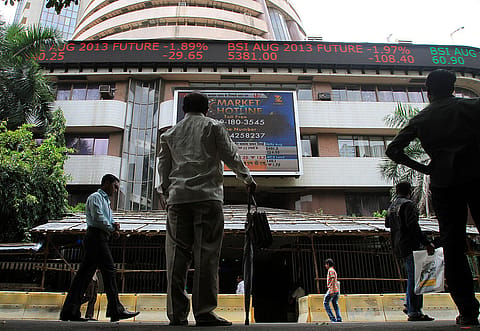Market weekly wrap: Sensex, Nifty drop 2.5% amid tariff chaos; will D-Street extend fall next week?
Investors’ wealth has been eroded by over ₹10 lakh this week after US President Donald Trump unveiled reciprocal tariffs that triggered a trade-war escalation.

The Indian stock market navigated a challenging week with sharp volatility as renewed trade war concerns after U.S. President Trump's reciprocal tariff announcements sent ripples through the global equities, including domestic bourses. The impact of U.S. tariffs was very strong, with both equity benchmarks BSE Sensex and NSE Nifty falling 2.5% each during the week ending April 4, 2025. The Nifty settled the week at 22,904.40, while the Sensex closed near the week’s low at 75,364.69.
In line with the benchmark indices, the broader market also seen sharp correction, with Nifty Midcap 150 and Nifty Small cap 250 indices declining by 2.3% and 2.1%, respectively, compared to the previous week. The meltdown eroded investors’ wealth over ₹10 lakh as total market capitalisation of the BSE listed companies dropped to ₹403.34 lakh crore.
Both Sensex and Nifty indices stared the financial year 2025-26 on shaky note, falling 1.8% on April 1, but it managed to regain some ground ahead of Trump's tariff announcements, rising around 0.8% on April 2. In the next two days, the benchmark indices lost over 1.5% as sentiment was dented amid concerns that higher-than-expected tariffs would severely hinder global economic growth, hurt corporate profits, spike inflation, and intensify existing trade conflict.
IT, Metal stocks tumble as tariffs cloud growth outlook
On the sectoral front, the IT space was the worst hit, falling over 9% amid fears that trade war would weaken discretionary spending demand in the U.S. Among others, Nifty Metal index dropped 7.5% this week, followed by Nifty Energy (3.76%), Nifty Auto (3.30%) as reciprocal tariffs reignited fears of global trade war.
The pharma index lost 2.7% amid sharp selling on Friday, triggered by report that Donald Trump is considering imposing tariffs on pharmaceutical goods. On April 2, the Trump administration imposed 26% tariffs on all imports from India, but exempted pharmaceuticals from higher reciprocal duty.
Among others, realty and consumer durables indices ended the week with a loss of 2.5%, while select pockets like FMCG, banking, and financial services showed relative resilience.
Recommended Stories
U.S. stocks hit hardest by tariff tumult
Trump's reciprocal tariff announcements triggered a massive sell-off across Wall Street, with the U.S. indices recording one of the biggest market erosions in history, wiping out a combined $6.6 trillion in value on just two days – Thursday and Friday. The U.S market has lost over $11 trillion in market capitalisation since January 17, before President Donald Trump took the oath of office and began his second term.
On Friday, the Dow Jones Industrial Average crashed 5.5% after losing 4% in the previous session, while the S&P 500 plunged 5.97%, adding to its Thursday’s fall of 4.84%. In a similar trend, the Nasdaq Composite closed 5.73% lower, extending previous session drop of 5.97%. There is fear in the market that a dramatic escalation of a trade war could drag the U.S. and global economies into a recession.
The sentiment was further dented after the Federal Reserve Chairman Jerome Powell expressed concern that President Trump's tariffs are likely to cause both increased inflation and a slowdown in economic growth. He also signaled that the Fed would delay any interest rate changes until the full economic consequences of the tariffs become clearer.
(INR CR)
Will Dalal Street continue sell-off next week?
The coming week is crucial for the market, packed with key domestic and global triggers. With tariff-related tensions escalating, global investors will closely track any further developments on that front, says Ajit Mishra – SVP, Research, Religare Broking.
The RBI Monetary Policy Committee (MPC) will unveil policy outcome on April 9, followed by key macroeconomic indicators—IIP and CPI data—on April 11. Adding to the action, the Q4 earnings season kicks off with IT giant TCS set to announce its results on April 10.
Mishra advised traders to maintain a “sell on rise” strategy for the Nifty index until a clear reversal or a retest of the 22,100-support level occurs. As earnings season begins, stock-specific action is likely to dominate, presenting opportunities on both the long and short sides.
Banking and financial stocks continue to display consistent strength and could remain in favor. Meanwhile, traders should navigate the broader market volatility with caution and consider hedging long positions using index puts, he said.
While the near-term volatility is a concern, sharp correction in commodity prices along with drop in the local bond yields is positive for Indian equities in the medium term, SBI Securities said in a note.